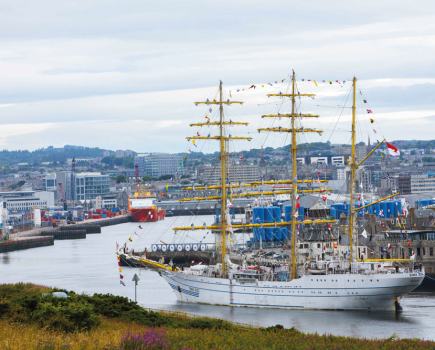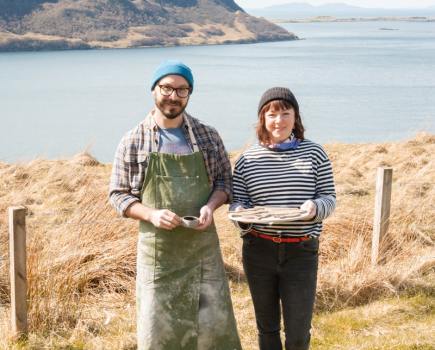The laidback city of Bristol is infused with maritime history, which you can explore by boat on the floating harbour. Add to this a vibrant foodie scene and the UK’s first inland surfing lake nearby, and you have a great location for a city break.
WORDS Alex Fisher
The people of Bristol love to eat. Everywhere you look there’s another inviting café or restaurant offering everything from innovative, plant-based vegan inventions to renowned Michelin-starred cuisine. Water weaves its story into every nook and cranny of this city too: you can eat authentic Spanish tapas in a repurposed shipping container, learn about maritime history and tour the city on the waterways. Take a trip on the Bristol Ferry (check first in case of possible temporary suspension due to coronavirus), around what’s known as the ‘floating harbour’, which has its origins in the 13th century, though its current form was created in the 1800s when locks separated the waterways from the tidal River Avon, ensuring the harbour would always be full.
This important harbour and dockland, which rivalled Liverpool in its heyday, became an icon of Victorian engineering, with Isambard Kingdom Brunel improving the canal system and The Bristol Harbour Railway, a joint venture by the Great Western Railway and the Bristol & Exeter Railway, opening in 1872. Today the warehouses have become shops, museums and restaurants, but you can still hop aboard the SS Great Britain, Brunel’s pioneering ‘luxury cruise liner’, built in 1843.
Recently, Bristol became a focus of the Black Lives Matter movement, when people gathered to remove the statue of 17th century slave trader Edward Colston. Much of the wealth of the city was derived from the slave trade, and a visit to the M Shed Museum provides an insightful record of this appalling period of British history.
FRIDAY PM
6PM: Where to stay in Bristol
After a long journey in heavy rain it was a delight to slip into the subterranean spa at the Bristol Harbour Hotel. The building was once a bank – the original heavy metal doors of the underground safe remain, contrasting with the calming, modern décor and sound of bubbling water from the large Jacuzzi. Small, but perfectly formed, there’s a pool, steam room and sauna, as well as treatment rooms, tucked away beneath this trendy hotel where we’ll be spending our first night (01172 034445, harbourhotels.co.uk/bristol).
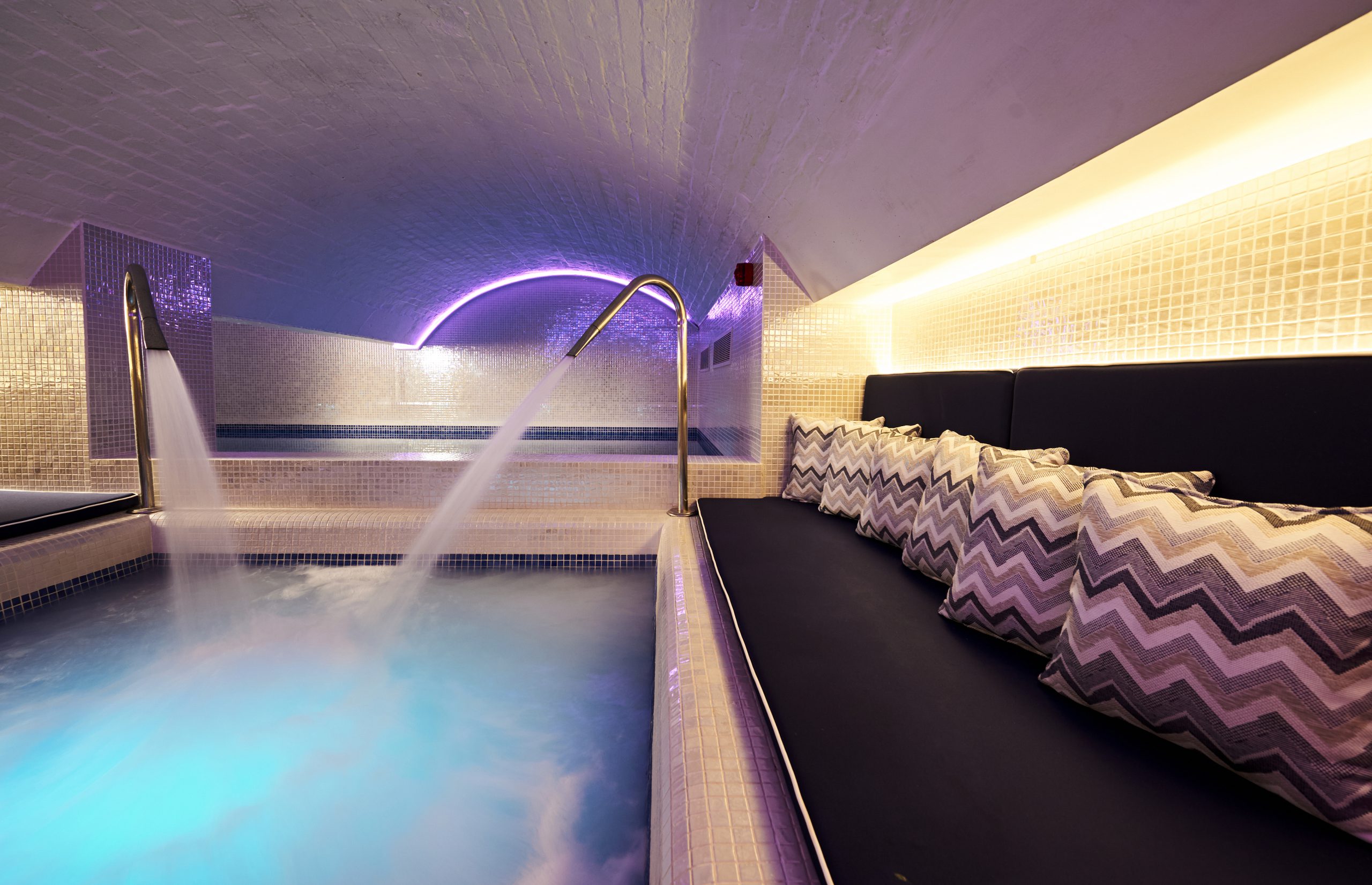
8PM: Dinner at The Jetty
The hotel’s restaurant, The Jetty, offers simple, modern food in a dramatic, stylish setting. Velvet sofas and a well-stocked bar sit beneath a high ceiling, making for a cool, but relaxed location that attracts locals as well as hotel guests. The pan-seared scallops were delicious served with maple cured bacon (£10), and the steak so tender the knife sliced through it like butter (steaks from £21).
SATURDAY AM
10AM: Discover Bristol's history
After breakfast, we catch a Bristol Ferry to the SS Great Britain. A real gem, the ferry runs daily to a regular timetable with plenty of stop-off points and single tickets start from just £1.80. The crew point out various attractions as we chug along, sharing stories of the city’s history. A two-and-a-half-hour tour costs £15, check the website for post-lockdown operating times (0117 9273416, bristolferry.com). We hop off beneath the towering masts of the SS Great Britain. Now permanently moored at the Great Western Dockyard, the ship attracts around 200,000 visitors a year. Alongside sits Being Brunel, an interactive museum documenting this famous engineer’s life and work. Hugely attractive to adults interested in maritime history, you might think this wouldn’t be so entertaining to children, but you’d be wrong. As you enter, you pick up tickets featuring photos and biographies of people who travelled on the ship. Whether it was Rachel Henning, a 35-year-old ‘entrepreneur’ from Somerset who travelled to Australia, or 28-year-old writer Frances Isabella Duberly who went to India, seeing their photos and quotes from their trip really brings history to life. This, plus the slightly eerie mannequins going about their business in every corner of the vessel, made for an interesting outing for all ages. We marvelled at how small the beds were, how gory the surgery was, while others were fascinated by the pioneering screw propeller technology. Tickets cost £18 for adults and £10 for children, under-fours go free, and you need to book a timed slot in advance (ssgreatbritain.org).
Read 10 Best Historic Ships to Visit
SATURDAY PM
1PM: Lunch in Bristol
We take a stroll by the water down to Cargo at Wapping Wharf, where re-purposed shipping containers have been transformed into international food outlets. On the upper deck of Cargo 2, Gambas offers authentic Spanish tapas influenced by one of my favourite regions of the country, Catalonia. I start with a sublime blood orange mimosa, made with homemade orange syrup, and have to resist the temptation to have a second. I love the chance to sample lots of different small dishes rather than one big one, so we opt for some traditional albondigas (meatballs) and gambas pil pil (prawns with garlic and chilli), as well as more unique dishes, including pollack a la plancha with parsnip purée, braised ox cheek and roasted beetroot with goat’s curd, almonds and dill. The sun shone – for a moment I felt like I was on the Catalan coast. Prices from £3.50- £13.50 book online (0117 9349256, gambasbristol.co.uk).
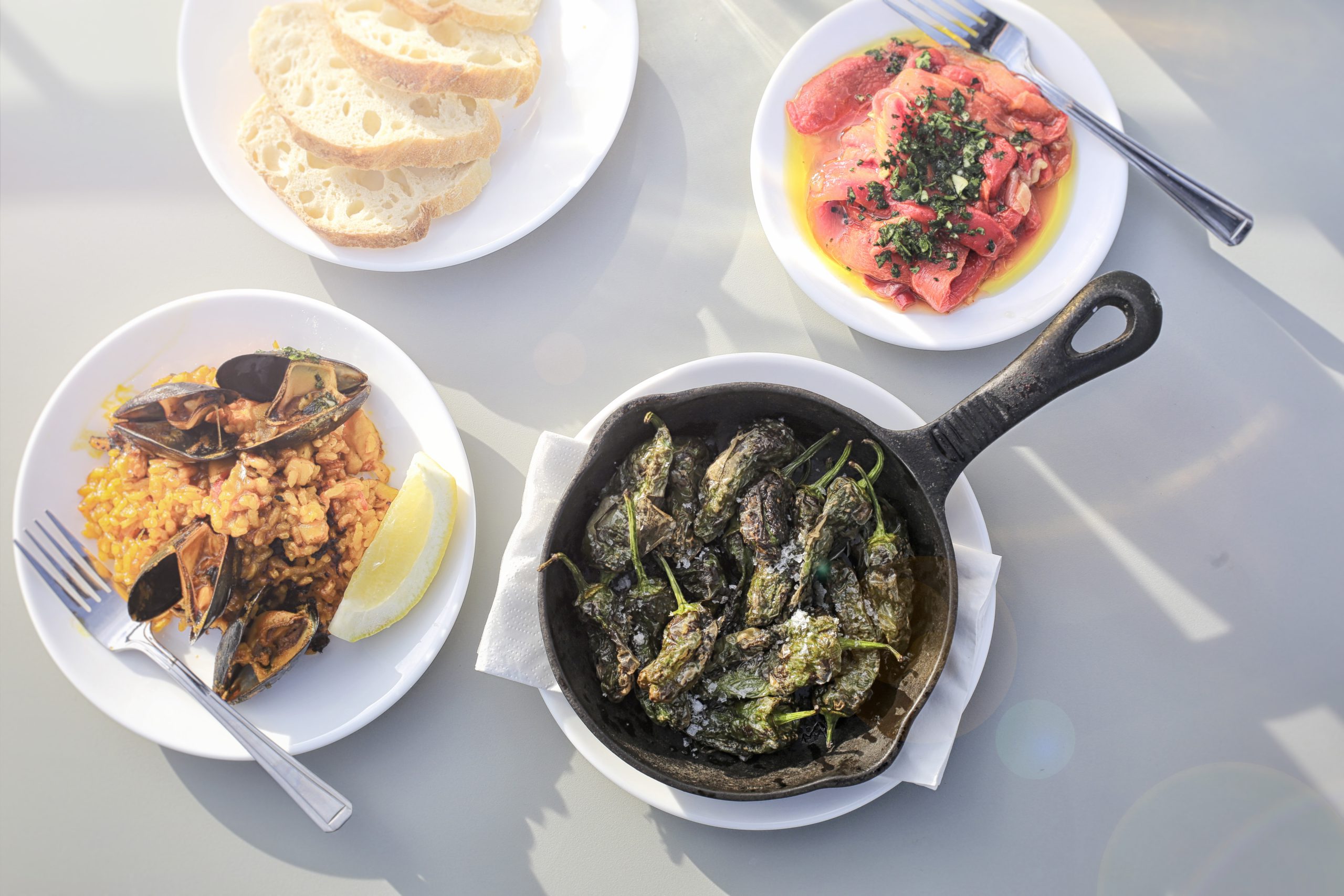
3PM: What can you do for free in Bristol?
To walk off a little of our lunch, we wander back along the canal to M Shed on the Harbourside at Princes Wharf, a social history museum that sits just opposite the Matthew, a wooden reconstruction of John Cabot’s ship that sailed to Newfoundland in 1497 (entry is free). M Shed offers an insight into the history of this port, shedding light on the transatlantic slave trade in the 17th and 18th century, when Bristol was integral in the transportation of enslaved people from Africa to America and the Caribbean. This horrendous business was ended in the British Isles by an Act of Parliament in 1807. Many exhibitions are free, some have varied ticket prices (0117 332971, bristolmuseums.org.uk).
6PM: A change of hotel
We check in to The Bristol Hotel, an iconic venue that was built in the 1970s. (The once- reviled honeycomb concrete of the neighbouring car park is now Grade II listed). Sitting directly on the waterfront, it’s a great location from which to explore the city on foot. The hotel restaurant, the River Grille, has floor-to-ceiling windows offering fantastic views of the harbour, while the menu focuses on locally sourced ingredients with fish and seafood being a real highlight (0117 9230333, doylecollection.com/hotels/the-bristol-hotel).
SUNDAY AM
10AM: Learning to Surf in Bristol
It’s about a 25-minute drive from Bristol to The Wave, an innovative inland surfing lake that opened in 2019. The first of its kind in the UK, with guaranteed waves, it has already attracted surfers from all over the country, including the British Olympic Team. The journey takes you through the city onto a motorway, so leave plenty of time to get there if you are staying in Bristol. A winding track slips off the main road and we enter a large parking area with a hut. Usually a minibus picks up surfers and transports them across the 75-acre site to the 180m lake, but owing to changes to allow social distancing you should leave about 15 minutes to walk to the centre now. The Wave also asks that anyone who has a wetsuit and their own board to use them at the current time, though the company still has them for hire (with extra cleaning now factored in) for those who do not have their own. As we go through the process of booking in, watching training videos, picking up equipment and changing into wetsuits, it makes sense why we were asked to arrive an hour before our session starts.
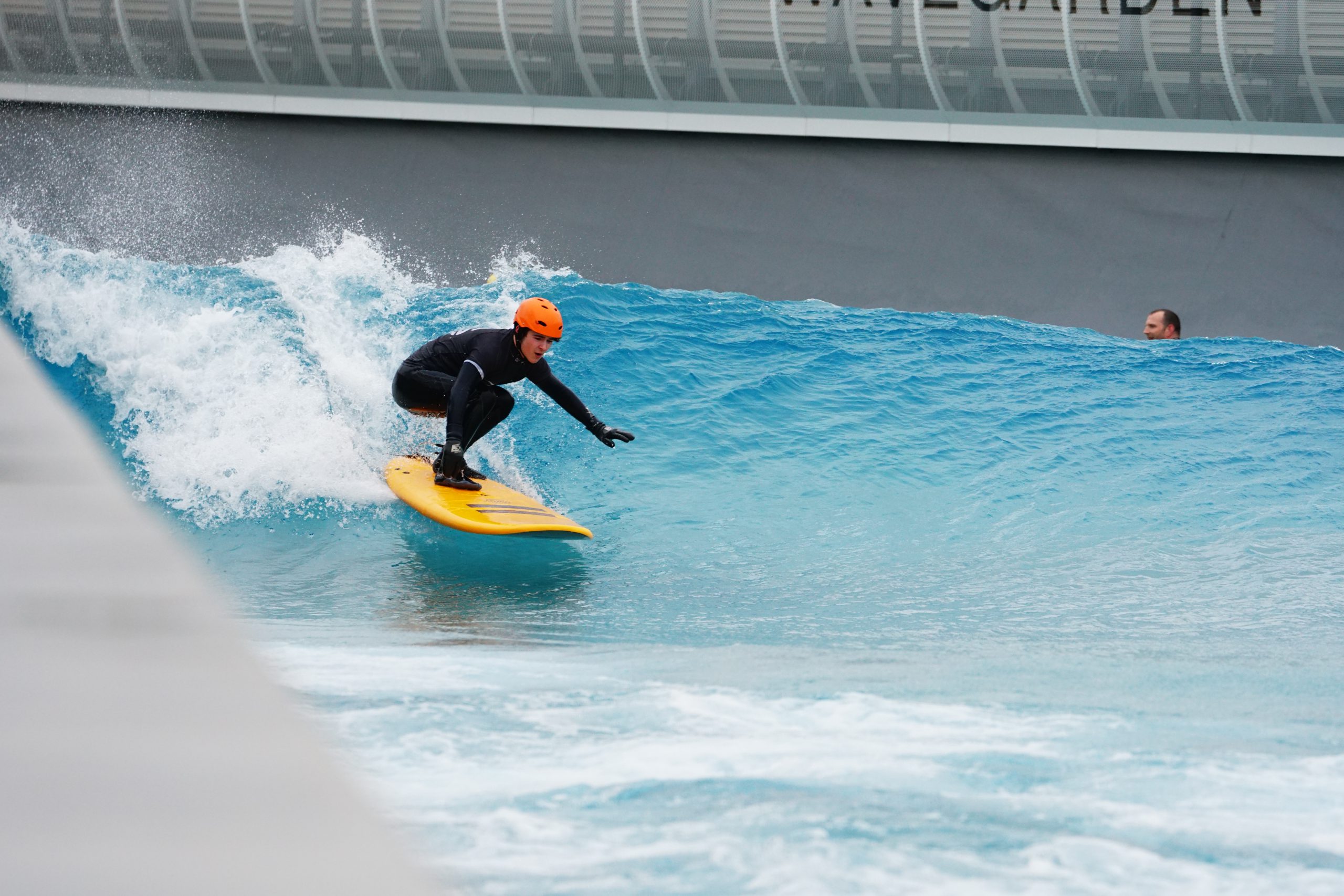
Waves range from 50cm for beginners to around two metres. My son tries an intermediate session as I tour the site, checking out new glamping tents and chatting to regulars who have been coming since The Wave opened. There’s a great community atmosphere, a real sense of positivity and passion from staff around not just the love of surfing, but also the environmental credentials of the project and the accessibility of the building, which is designed to be wheelchair-friendly throughout, including access to the water. I watch as my son catches some waves and gives a thumbs-up.
There’s a great on-site café with huge windows overlooking the lake, so we tuck into a chickpea and pickled pepper tagine and a buttermilk chicken burger with aioli before we head off. Meals range from around £7.50 to £14. You’ll need to wear a mask indoors, so make sure you bring one with you… An hour’s surf session costs £40 for adults and £30 for under-16s and must be booked in advance (0333 0164133, thewave.com).
SUNDAY PM
10AM: Activities for Children in Bristol
Bristol has a great appeal for adults, but there’s also loads for children to do in the city centre. We head to We The Curious, an interactive science centre, and find a seat in the planetarium, where, with the help of 3D glasses, we are transported into space (0117 9151000, wethecurious.org). We The Curious reopens in November, and in the meantime there are lots of resources to avail of at home on its website. You’ll find an aquarium opposite the science museum, and also a great ice-cream shop that uses Somerset milk to create its mouthwatering gelato, Swoon, just a few minutes’ walk away (0117 9290093, swoononaspoon.co.uk).
6PM: Fish and chips finale
For our final meal before we head home, we return to Cargo for fish and chips at Salt & Malt. Run by Michelin-starred chef Josh Eggleton, of Pony and Trap country pub fame, this seems like a cheaper alternative to visiting his Michelin-starred restaurant. Staff welcome us with a delicious deep-fried oyster, and we are quickly trying fishcakes, crushed garden peas, battered haddock and perfect chips. A great way to finish a fantastic weekend. Currently Salt & Malt is only open for takeaway food, but keep an eye on the website for updates. Fish from £8.50 and chips £2 (0117 9276454, saltmalt.com).
For more travel inspiration around the British Isles, head to our Weekends Away section, or pick up a copy of Coast magazine!.
NEED TO KNOW
STAY AT…
coast stayed the The Bristol Hotel and The Harbour Hotel, Bristol. Waterfront rooms in The Bristol Hotel (pictured) start with the Deluxe King room (which are the waterfront rooms) from £95 B&B per night (0117 9230333, doylecollection.com/hotels/the-bristol-hotel).
Rooms in The Harbour Hotel Bristol start from £125 for a double room on a room-only basis (01172 034445, harbourhotels.co.uk/bristol).
HOW TO GET THERE
If you can, take the train! Great Western Railway runs a regular service to Bristol Temple Meads, and you can pick up a Bristol Ferry just outside the station (prices vary, gwr.com).
If driving, Bristol is easy to access via both the M4 and the M5, depending on where you are travelling from.
For more information, go to visitbristol.co.uk.
The laidback city of Bristol is infused with maritime history, which you can explore by boat on the floating harbour. Add to this a vibrant foodie scene and the UK’s first inland surfing lake nearby, and you have a great location for a city break.
WORDS Alex Fisher
The people of Bristol love to eat. Everywhere you look there’s another inviting café or restaurant offering everything from innovative, plant-based vegan inventions to renowned Michelin-starred cuisine. Water weaves its story into every nook and cranny of this city too: you can eat authentic Spanish tapas in a repurposed shipping container, learn about maritime history and tour the city on the waterways. Take a trip on the Bristol Ferry (check first in case of possible temporary suspension due to coronavirus), around what’s known as the ‘floating harbour’, which has its origins in the 13th century, though its current form was created in the 1800s when locks separated the waterways from the tidal River Avon, ensuring the harbour would always be full.
This important harbour and dockland, which rivalled Liverpool in its heyday, became an icon of Victorian engineering, with Isambard Kingdom Brunel improving the canal system and The Bristol Harbour Railway, a joint venture by the Great Western Railway and the Bristol & Exeter Railway, opening in 1872. Today the warehouses have become shops, museums and restaurants, but you can still hop aboard the SS Great Britain, Brunel’s pioneering ‘luxury cruise liner’, built in 1843.
Recently, Bristol became a focus of the Black Lives Matter movement, when people gathered to remove the statue of 17th century slave trader Edward Colston. Much of the wealth of the city was derived from the slave trade, and a visit to the M Shed Museum provides an insightful record of this appalling period of British history.
FRIDAY PM
6PM: Where to stay in Bristol
After a long journey in heavy rain it was a delight to slip into the subterranean spa at the Bristol Harbour Hotel. The building was once a bank – the original heavy metal doors of the underground safe remain, contrasting with the calming, modern décor and sound of bubbling water from the large Jacuzzi. Small, but perfectly formed, there’s a pool, steam room and sauna, as well as treatment rooms, tucked away beneath this trendy hotel where we’ll be spending our first night (01172 034445, harbourhotels.co.uk/bristol).

8PM: Dinner at The Jetty
The hotel’s restaurant, The Jetty, offers simple, modern food in a dramatic, stylish setting. Velvet sofas and a well-stocked bar sit beneath a high ceiling, making for a cool, but relaxed location that attracts locals as well as hotel guests. The pan-seared scallops were delicious served with maple cured bacon (£10), and the steak so tender the knife sliced through it like butter (steaks from £21).
SATURDAY AM
10AM: Discover Bristol's history
After breakfast, we catch a Bristol Ferry to the SS Great Britain. A real gem, the ferry runs daily to a regular timetable with plenty of stop-off points and single tickets start from just £1.80. The crew point out various attractions as we chug along, sharing stories of the city’s history. A two-and-a-half-hour tour costs £15, check the website for post-lockdown operating times (0117 9273416, bristolferry.com). We hop off beneath the towering masts of the SS Great Britain. Now permanently moored at the Great Western Dockyard, the ship attracts around 200,000 visitors a year. Alongside sits Being Brunel, an interactive museum documenting this famous engineer’s life and work. Hugely attractive to adults interested in maritime history, you might think this wouldn’t be so entertaining to children, but you’d be wrong. As you enter, you pick up tickets featuring photos and biographies of people who travelled on the ship. Whether it was Rachel Henning, a 35-year-old ‘entrepreneur’ from Somerset who travelled to Australia, or 28-year-old writer Frances Isabella Duberly who went to India, seeing their photos and quotes from their trip really brings history to life. This, plus the slightly eerie mannequins going about their business in every corner of the vessel, made for an interesting outing for all ages. We marvelled at how small the beds were, how gory the surgery was, while others were fascinated by the pioneering screw propeller technology. Tickets cost £18 for adults and £10 for children, under-fours go free, and you need to book a timed slot in advance (ssgreatbritain.org).
Read 10 Best Historic Ships to Visit
SATURDAY PM
1PM: Lunch in Bristol
We take a stroll by the water down to Cargo at Wapping Wharf, where re-purposed shipping containers have been transformed into international food outlets. On the upper deck of Cargo 2, Gambas offers authentic Spanish tapas influenced by one of my favourite regions of the country, Catalonia. I start with a sublime blood orange mimosa, made with homemade orange syrup, and have to resist the temptation to have a second. I love the chance to sample lots of different small dishes rather than one big one, so we opt for some traditional albondigas (meatballs) and gambas pil pil (prawns with garlic and chilli), as well as more unique dishes, including pollack a la plancha with parsnip purée, braised ox cheek and roasted beetroot with goat’s curd, almonds and dill. The sun shone – for a moment I felt like I was on the Catalan coast. Prices from £3.50- £13.50 book online (0117 9349256, gambasbristol.co.uk).

3PM: What can you do for free in Bristol?
To walk off a little of our lunch, we wander back along the canal to M Shed on the Harbourside at Princes Wharf, a social history museum that sits just opposite the Matthew, a wooden reconstruction of John Cabot’s ship that sailed to Newfoundland in 1497 (entry is free). M Shed offers an insight into the history of this port, shedding light on the transatlantic slave trade in the 17th and 18th century, when Bristol was integral in the transportation of enslaved people from Africa to America and the Caribbean. This horrendous business was ended in the British Isles by an Act of Parliament in 1807. Many exhibitions are free, some have varied ticket prices (0117 332971, bristolmuseums.org.uk).
6PM: A change of hotel
We check in to The Bristol Hotel, an iconic venue that was built in the 1970s. (The once- reviled honeycomb concrete of the neighbouring car park is now Grade II listed). Sitting directly on the waterfront, it’s a great location from which to explore the city on foot. The hotel restaurant, the River Grille, has floor-to-ceiling windows offering fantastic views of the harbour, while the menu focuses on locally sourced ingredients with fish and seafood being a real highlight (0117 9230333, doylecollection.com/hotels/the-bristol-hotel).
SUNDAY AM
10AM: Learning to Surf in Bristol
It’s about a 25-minute drive from Bristol to The Wave, an innovative inland surfing lake that opened in 2019. The first of its kind in the UK, with guaranteed waves, it has already attracted surfers from all over the country, including the British Olympic Team. The journey takes you through the city onto a motorway, so leave plenty of time to get there if you are staying in Bristol. A winding track slips off the main road and we enter a large parking area with a hut. Usually a minibus picks up surfers and transports them across the 75-acre site to the 180m lake, but owing to changes to allow social distancing you should leave about 15 minutes to walk to the centre now. The Wave also asks that anyone who has a wetsuit and their own board to use them at the current time, though the company still has them for hire (with extra cleaning now factored in) for those who do not have their own. As we go through the process of booking in, watching training videos, picking up equipment and changing into wetsuits, it makes sense why we were asked to arrive an hour before our session starts.

Waves range from 50cm for beginners to around two metres. My son tries an intermediate session as I tour the site, checking out new glamping tents and chatting to regulars who have been coming since The Wave opened. There’s a great community atmosphere, a real sense of positivity and passion from staff around not just the love of surfing, but also the environmental credentials of the project and the accessibility of the building, which is designed to be wheelchair-friendly throughout, including access to the water. I watch as my son catches some waves and gives a thumbs-up.
There’s a great on-site café with huge windows overlooking the lake, so we tuck into a chickpea and pickled pepper tagine and a buttermilk chicken burger with aioli before we head off. Meals range from around £7.50 to £14. You’ll need to wear a mask indoors, so make sure you bring one with you… An hour’s surf session costs £40 for adults and £30 for under-16s and must be booked in advance (0333 0164133, thewave.com).
SUNDAY PM
10AM: Activities for Children in Bristol
Bristol has a great appeal for adults, but there’s also loads for children to do in the city centre. We head to We The Curious, an interactive science centre, and find a seat in the planetarium, where, with the help of 3D glasses, we are transported into space (0117 9151000, wethecurious.org). We The Curious reopens in November, and in the meantime there are lots of resources to avail of at home on its website. You’ll find an aquarium opposite the science museum, and also a great ice-cream shop that uses Somerset milk to create its mouthwatering gelato, Swoon, just a few minutes’ walk away (0117 9290093, swoononaspoon.co.uk).
6PM: Fish and chips finale
For our final meal before we head home, we return to Cargo for fish and chips at Salt & Malt. Run by Michelin-starred chef Josh Eggleton, of Pony and Trap country pub fame, this seems like a cheaper alternative to visiting his Michelin-starred restaurant. Staff welcome us with a delicious deep-fried oyster, and we are quickly trying fishcakes, crushed garden peas, battered haddock and perfect chips. A great way to finish a fantastic weekend. Currently Salt & Malt is only open for takeaway food, but keep an eye on the website for updates. Fish from £8.50 and chips £2 (0117 9276454, saltmalt.com).
For more travel inspiration around the British Isles, head to our Weekends Away section, or pick up a copy of Coast magazine!.
NEED TO KNOW
STAY AT…
coast stayed the The Bristol Hotel and The Harbour Hotel, Bristol. Waterfront rooms in The Bristol Hotel (pictured) start with the Deluxe King room (which are the waterfront rooms) from £95 B&B per night (0117 9230333, doylecollection.com/hotels/the-bristol-hotel).
Rooms in The Harbour Hotel Bristol start from £125 for a double room on a room-only basis (01172 034445, harbourhotels.co.uk/bristol).
HOW TO GET THERE
If you can, take the train! Great Western Railway runs a regular service to Bristol Temple Meads, and you can pick up a Bristol Ferry just outside the station (prices vary, gwr.com).
If driving, Bristol is easy to access via both the M4 and the M5, depending on where you are travelling from.
For more information, go to visitbristol.co.uk.
















